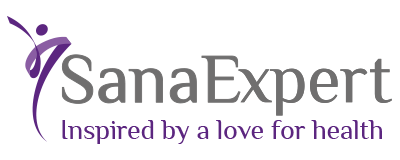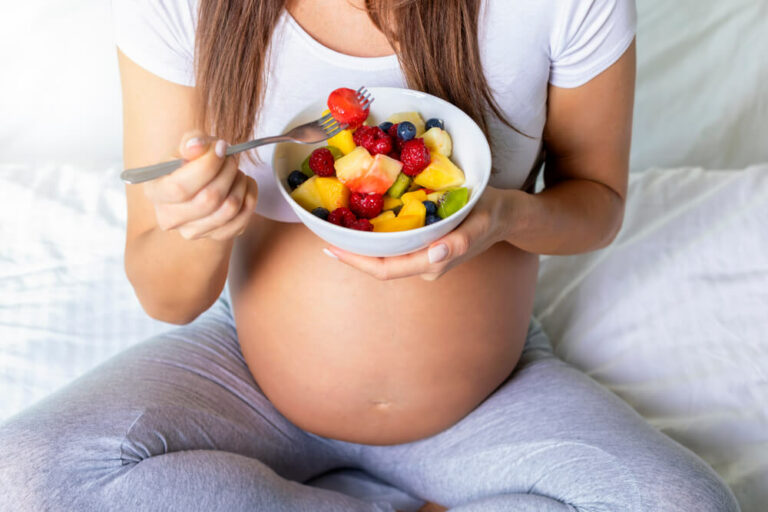How to eat properly during pregnancy is an important issue for most pregnant women. However, the multitude of tips can quickly become overwhelming and confusing. But do not worry – it’s not that complicated at all. In principle, the same recommendations apply to you as a pregnant woman as to non-pregnant women. Basically, a balanced diet in combination with physical activity has a positive effect on you and your unborn baby. If you lived a healthy lifestyle before you became pregnant, you only need to make minor adjustments. If not, the beginning of a pregnancy is the ideal time to start with a change in diet.
1.1. Nutrient supply during pregnancy
From the beginning of pregnancy, your body needs more vitamins and minerals than usual, but not yet any extra calories. Only in the last months of pregnancy do you need a little more energy. The additional requirement of approx. 250 kcal per day can be covered with a slice of whole meal bread with cheese and a tomato. The rule is: Don’t eat twice as much but eat twice as well!
Folic acid, vitamin B12, vitamin D3, omega-3 fatty acids, iron and iodine are particularly important for the development of the child. Fruit, vegetables and whole grain products should definitely be on your menu. Fruits and vegetables provide important vitamins and the fiber contained in whole grain products keep the intestines going. In addition, whole grain bread contains twice as much iron and magnesium as white bread.
Animal foods should be eaten in moderation. For meat and meat products, prefer the low-fat varieties and for sea fish regularly choose the high-fat types such as salmon, mackerel, sardine or herring. These not only contain iodine, but also important omega-3 fatty acids. Raw meat and raw fish are taboo during pregnancy!
Potatoes, spinach, cabbage, tomatoes, oranges and strawberries are also suitable sources of folate, the natural form of folic acid. However, the higher requirements for iodine and folic acid cannot be met through food alone. Appropriate preparations should also be taken during pregnancy.
SanaExpert Natalis contains ingredients of natural origin and is composed of many important micronutrients that can support the healthy development of the child already in the womb. Iron contributes to the formation of red blood cells, the intake of the omega-3 fatty acid DHA (700 mg) helps in the development of the brain and nerve functions, and folic acid supports maternal tissue growth. Iodine is important for the bones and vitamins C, B6, B12 as well as folic acid, zinc, selenium, iron and copper contribute to the functionality of a normal immune system in the baby. Iodine can also help promote the child’s growth. The intake of nutrients during pregnancy is recommended by many specialist groups, such as midwives and gynecologists, as well as leading health organizations. This can have a positive influence on the child’s cognitive and conative abilities and, last but not least, reduces the risk of possible diseases. Many of our customers therefore trust our products from the SanaExpert Natalis 3-phase concept right from the start throughout their pregnancy! Find out more and create the ideal framework for the perfect start in the life of your little wonder.
1.2. Vegetarian and vegan diet during pregnancy
A vegetarian diet during pregnancy is not a problem, provided you have a balanced diet and, in addition to plant-based foods, also eat dairy products and eggs for a sufficient supply of calcium and protein. If you do not like milk, you should use other milk products (kefir, buttermilk, yogurt, semi-hard cheese) or drink fruit juices that are fortified with calcium.
If you are lactose intolerant, you can use soy milk and soymilk products. These also contain a lot of protein.
In addition to an adequate intake of folic acid and iodine, you may also have to ensure that iron is consumed as required. Therefore, have your iron status checked regularly. Eat an iron-rich diet in the form of legumes (lentils, chickpeas), vegetables (spinach, beetroot) or cereals (millet, whole grain products). A glass of orange juice with meals improves iron absorption.
On the other hand, a vegan diet is not advisable during pregnancy, as this harbors serious risks for the unborn child. If the child completely renounces animal products, the adequate supply of all nutrients cannot be guaranteed. In this case, you should definitely get information from a nutritionist and, after consulting your doctor, take appropriate supplements.
1.3. What foods should be avoided
To avoid infections with Listeria bacteria, which can harm your unborn baby, no raw animal foods such as raw milk, meat, fish or eggs should be consumed. Therefore, pay attention to the packaging when buying dairy products. If it says, “au lait cru” (= made from raw milk), then it is better to leave the product out. Also pay attention to hygiene when handling food and heat meat, fish and eggs properly (inside 70 ° C for at least 2 minutes).
Caution is also advised with liver products (such as liver sausage, pâté, etc.). These products contain vitamin A in high concentrations. Too much vitamin A can be harmful to your baby.
The consumption of alcohol must be strictly and without exception refrained from throughout pregnancy. The risk of permanent damage to the fetus is too high. That is why there is an absolute zero tolerance here.
As already mentioned, a healthy diet is the alpha and omega of pregnancy. Of course, you can treat yourself to a sweet snack every now and then. However, it is advisable not to reach into the candy drawer too often and uncontrollably so as not to negatively affect the baby’s weight development and to risk complications during pregnancy.
If you stick to these rough recommendations and ensure an adequate, needs-covering supply of nutrients, nothing stands in the way of a healthy pregnancy and you can be sure that you are doing everything right for the well-being of your baby.

